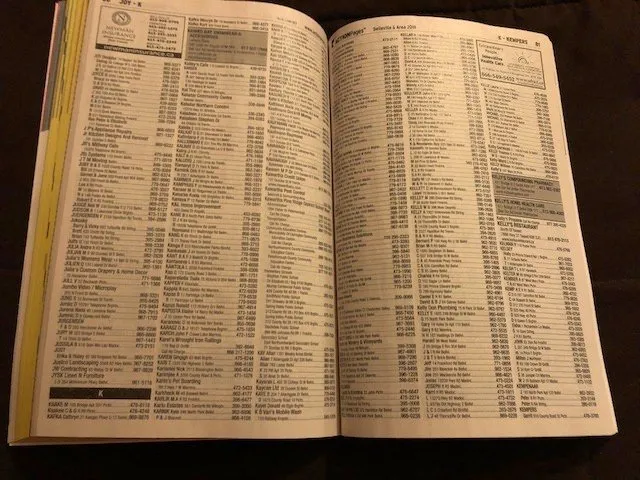
This is something called a phone book. Every year (usually sometime in January) a new phone book is printed and distributed.
This Reference Guide Was Once A Very Coveted Item In Every Household
There was usually a special area in the house where the book was stored for safe keeping. Its value was in the information that it contained. This included an alphabetical listing of each family (by last name) that resided in the jurisdiction of each geographically area listed on the book's cover or within its index.
In addition to names, this book also contained the family's geographical home address and the actual phone number corresponding to each family's house.
If you lived in a big urban centre or city, the phone book for your area was daunting large. As such the larger phone books were often used as booster seats for small children or as a stepping stool when you really only needed an extra foot to reach an object on a higher shelf, for example. I can tell you that families would often joke about the uses that they had come up with to turn their copy into a multi-purpose household tool. It almost became a game of sorts.

Phone Books Only Contained Phone Numbers Which Were Land-lines, They Didn't And Don't Contain Cell Phone Numbers
When you think about this concept, the books were a complete invasion of personal privacy. With the increase in cell phone use, more and more people no longer have land-lines in their homes. As a result, the phone books are shrinking every year in size. In the photos above, you can see my area's 2018 phone book.
It's 174 pages, most of which are considered "yellow pages" which are dedicated to business advertising.
It is the advertisers who pay for advertising space within the books that ultimately cover the costs to produce and circulate the books. The books are then distributed for free to all the houses and businesses in the area.
Most people are simply recycling these books as soon as they receive them. It's quicker to search the web for information rather than hunt for it in a book and because many people no longer keep land-lines, the books have very little practical use anymore.
Out Of Curiosity, Do You Still Keep A Land-Line Active In Your Home Or, Have You Completely Switched Over to Cellular?
I welcome your comments and I invite you to follow me on my journey...I have dropped my land-lines and the next thing that I will be doing is unbanking....very happily I might add. ;)

~ Rebecca Ryan